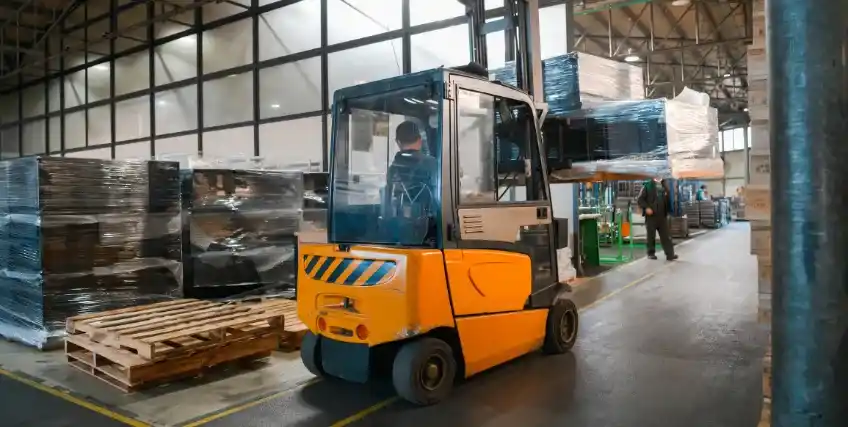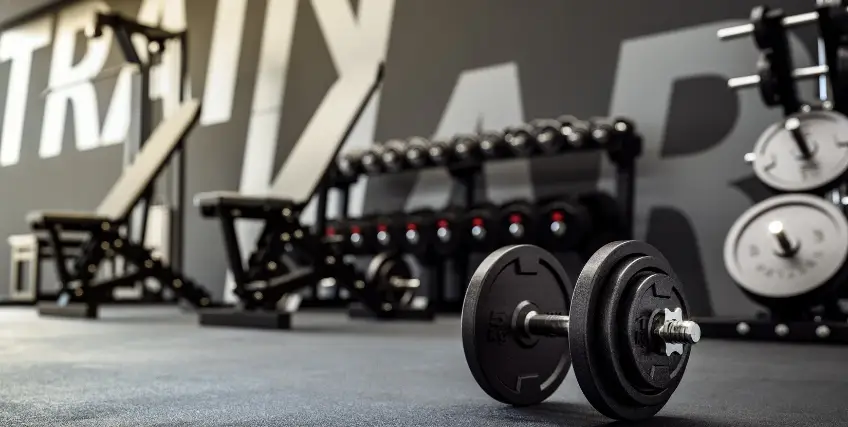Looking for Business Financing?
Apply now for flexible business financing. Biz2Credit offers term loans, revenue-based financing, lines of credit, and commercial real estate loans to qualified businesses.
Set up a Biz2Credit account and apply for business financing.
Key Takeaways
Understand what commercial equipment finance is and why businesses with limited credit may still qualify.
Explore lender requirements, documentation needs, and the factors that influence credit approval.
Learn about equipment leasing, small business equipment loans, and other alternative equipment funding options.
Get practical tips to improve approval chances, even with short business history or limited credit.
Many companies find it difficult to purchase business equipment as they can be really expensive. Paying a heavy upfront cost for the equipment can disrupt their cash flow management and operations. This is why most businesses opt for commercial equipment loans. However, for new businesses it can be difficult to get loan approval because of limited credit or short history. It may be challenging to get funds from traditional banks.
Nevertheless, there are alternative commercial equipment finance options for growing businesses that have limited and short credit history. There are many lenders that understand that startups need early access to equipment to stay competitive. Even with limited credit, businesses may still qualify for funding because the equipment itself acts as strong collateral.
This article explores small business equipment loans, equipment leasing options and other alternative equipment funding options for businesses that have a short history and are still building credit. Learn how such businesses can improve their chances of credit approval, what lenders look for, what documents may be needed, which financing solution may be an ideal choice.
What Is Commercial Equipment Finance?
Commercial equipment finance is a funding solution designed especially to help business acquire equipment needed to run their company. Equipment may include machinery, tools, vehicles, medical equipment, technology or used equipment.
This is a type of financing that is self-secured because the equipment acts as collateral. This reduces risk for the lender which is why many extend funding to small business owners who are still building their credit.
Businesses across the U.S. from manufacturing and logistics to healthcare and construction, rely heavily on equipment. According to the U.S. Bureau of Economic Analysis (BEA), trillions of dollars are invested annually in business equipment and software. This shows the importance of equipment financing solutions, especially for startup companies and growing small businesses.
Why Businesses With Limited Credit May Still Qualify for Commercial Equipment Finance
Unlike unsecured loans, commercial equipment finance depends upon the value of the equipment and how long it lasts. This gives lenders confidence to extend loans to businesses that do not have long credit history. This is also why equipment finance companies, alternative lenders, and independent providers often offer quite flexible financing terms.
Following are some of the factors why commercial equipment finance is possible for businesses with low credit:
Equipment as Collateral
Most commercial equipment loans are self-collateralized. This means the lender secures the financing with the equipment itself, reducing risk on their end during underwriting.
Growing Demand Across Industries
Across the U.S., new businesses continue to enter the market every year, and many of them rely heavily on equipment to begin operations. Sectors such as construction, transportation, manufacturing, healthcare, and supply chain services require essential machinery or technology even at the earliest stages of their business journey.
This sustained demand across industries is one of the key reasons lenders and equipment finance companies continue to offer commercial equipment finance solutions even to young or credit-thin businesses.
Industry Stability Matters
Lenders review the business model, industry trends, and potential revenue streams. A business in transportation, construction, or medical services may show stronger demand for equipment due to the nature of their work.
Common Lender Requirements for Commercial Equipment Finance
Even if the equipment acts as collateral, lenders may still need clarity about the financial position about the business.
Requirements may vary for each lender but following are some factors that almost all providers consider:
Time in Business
Annual Revenue
Business Credit and Personal Credit
Down Payment
Equipment Type
Industry Risk
Most traditional lenders may prefer businesses with at least two years of operating history. Alternative lenders may be more flexible and work with companies operating for as little as 6–12 months.
In the absence of enough credit history, lenders usually review business annual revenue or average monthly income to assess their repayment ability. While the exact figures vary, businesses showing consistent cash flow improve their chances of credit approval.
Since the business credit is not enough for the lenders to assess creditworthiness, they may rely on the personal credit of the business owner. They may look at the credit usage, payment history, and financial responsibility of the owner.
Offering a down payment can reduce risk for the lender and may help secure flexible terms, especially for a startup.
Lenders evaluate the condition, value, and lifespan of the equipment. Though new machinery often strengthens the case, but many providers offer financing solutions for used equipment as well based on its condition.
Industries like construction, trucking, and healthcare are considered essential and stable, making equipment loan approvals more likely even for young companies. For companies with higher industry risk, lenders may provide funds if other factors look favorable.
Documentation Needed for Commercial Equipment Finance
Businesses with limited credit must focus on preparing strong documentation. This signals readiness and can strengthen the lender’s confidence during underwriting.
Following is a list of key documents that most lenders seek:
Business Documents
Business license
Employer Identification Number (EIN)
Articles of incorporation
Voided business check
Operating agreements
Financial Records
Recent business bank statements
Profit & loss statements
Basic balance sheet
Cash flow projections
Tax Documentation
Personal tax returns (if required)
Business tax returns (if applicable)
Equipment Information
Detailed quote from vendor
Warranty or maintenance schedule
Serial number and specifications
Expected useful life of the equipment
What Lenders Prioritize When Credit Is Limited
When working with newer businesses, rather than looking at traditional credit score standards, lenders shift their focus toward other indicators of stability. Following are some of these factors that most lenders closely monitor:
Cash Flow Health
Strong cash flow often helps compensate for short credit history. Healthy business bank statements matter to lenders and they look for:
Regular deposits
Few overdrafts
Stable average daily balances
Positive working capital
Strength of the Business Model
Lenders want to see long-term commercial potential. Industries with recurring demand such as transportation, manufacturing, supply chain logistics, construction, and medical services, often have an advantage.
Personal Financial Strength
For startups, instead of business credit, lenders mostly look at the personal credit of the owner as their financial behavior may reflect the owner’s repayment reliability.
Equipment Value and Revenue Potential
Equipment that directly generates revenue, such as construction equipment or medical equipment, strengthens the application.
Alternative Financing Options for Limited Credit Businesses
If traditional bank financing is difficult, there are multiple alternative financing options designed to support business owners with limited credit. Following are some of these popular commercial equipment finance options for businesses with short credit history:
Equipment Leasing
Lower upfront costs
Flexible terms
Access to synthetic leases or a TRAC lease (useful for transportation equipment)
Vendor Financing
Equipment Finance Companies
SBA Microloans
Business Credit Cards or Lines of Credit
Online Lenders
Equipment leasing does not require full ownership. It often works well for high-cost items like medical equipment, real estate equipment, or construction equipment. Businesses benefit from:
Some manufacturers themselves offer equipment funding to business owners. This can be beneficial for small businesses that want predictable payments and competitive interest rates.
There are several independent equipment finance companies that are known to provide flexible solutions for commercial equipment finance. Most of them have programs specifically for businesses with short credit histories.
The SBA Microloan Program provides smaller-sized loans designed to help new or growing businesses cover essential expenses, including equipment funding for small business owners.
Small businesses may use short-term lines of credit or credit cards for initial purchases. These financing options should be used carefully to avoid liquidity strain.
There are many online lenders that offer faster funding decisions and flexible underwriting. They often review cash flow and recent bank activity instead of relying solely on long credit histories.
How to Improve Chances of Approval for Commercial Equipment Finance
Even with limited credit, there are several ways for businesses to strengthen their commercial equipment finance application.
Maintain Strong Business Banking Habits
Keep consistent daily balances
Reduce unnecessary withdrawals
Avoid overdrafts
Track spending across providers
Strengthen Personal Credit
Offer a Down Payment
Build a Strong Business Plan
Work With a Financing Partner
Paying down debts or reducing utilization helps in cases where lenders consider personal credit.
A down payment may reduce interest rates or secure flexible financing from a lender.
The business plan should clearly explain the revenue model, cash flow projection, the expected growth, and market demand. The business plan should also demonstrate the business' approach to managing financing needs.
A knowledgeable financing partner can guide you in understanding disclosures, underwriting expectations, and equipment financing trends. They may also help you compare financing services across banks, equipment finance companies, or broker-dealer networks.
Conclusion
New businesses may find it difficult to get a loan due to their low credit and limited history. However, if they need funding to acquire equipment, they do not need to worry. Through commercial equipment finance, even businesses with poor credit can find financing solutions.
There are several reasons why it is not so difficult to get commercial equipment loans with bad credit. One of the top reasons is because the equipment itself acts as the collateral which reduces the lender's risk. Today’s financing landscape includes a wide range of financing options, equipment leasing structures, and flexible financing programs that support young companies. Businesses just need to prepare well for their application through proper and complete documentation and by showcasing strong cash flow habits.
Whether the business is securing equipment for construction, transportation, healthcare, real estate, or supply chain operations, commercial equipment finance can be a reliable path to meeting their business needs and long-term goals.
FAQs About Commercial Equipment Finance
1. Can I qualify for commercial equipment finance with limited business credit?
Many lenders offer commercial equipment loans to businesses with short credit history. They evaluate cash flow, equipment value, and personal credit instead of relying solely on business credit.
2. What types of equipment can be financed?
Businesses can finance construction equipment, medical equipment, technology, vehicles, tools, or used equipment depending on the lender’s policy.
3. Do I need a down payment for commercial equipment loans?
A down payment is not mandatory for commercial equipment finance. However, if companies with low credit provide one, it can strengthen their application and may also improve terms.
4. What documents are required for credit approval?
The documents vary across lenders. However, most lenders typically need financial statements, bank statements, business licenses, equipment details, and personal financial information.
5. Can a startup get a small business equipment loan?
Many equipment finance companies work with startups. Since most startups have limited credit history, equipment value and projected cash flow influence approval.




